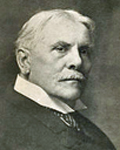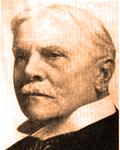|
RIGHTLY DIVIDING THE WORD OF TRUTH
Dr. Cyrus Ingerson
Scofield
"The purpose of this pamphlet is to
indicate
the more important divisions of the Word of truth."
Chapter 9:
SALVATION AND REWARDS
The Introduction and
previous chapters of Rightly Dividing
may be accessed via links in our Library.
In
this pamphlet, Dr. Scofield outlines some basic and
very important distinctions in Scripture that must be
acknowledged for proper understanding. Among these are
distinctions that are of particular concern to the
messianic community. Perhaps the two most important
distinctions in this regard are those between Israel and
the Church and between the various ages in God's
dealings with mankind, the latter of which are often
referred to as "dispensations," each of which has been
initiated by a covenant that radically altered God's
expectations of those with whom He made the covenant and
with those who subsequently entered into it.
Many reject the doctrine of
dispensationalism, often on the grounds that it was
invented by C.I. Scofield, a late eighteenth - early
nineteenth century American minister. By the same token,
many have rejected the doctrine of salvation by grace
alone through faith alone on the same grounds: It was
invented by Luther. Of course, Luther didn't invent the
doctrine; it was in Scripture all the time. Similarly,
Scofield didn't invent dispensationalism; it was in
Scripture all the time. He merely brought it to the
notice of millions, particularly through The
Scofield Reference Bible, first published in 1909.
Furthermore, there were many before him that recognized
distinctions between the ages and developed the concept
to varying degrees, at least as far back as Justin
Martyr (A.D. 110-165) - virtually on the heels of Paul,
who so copiously expounded on the subject. So there
really was an unbroken line, or virtually unbroken line,
of church leaders and theologians who recognized these
"dispensations."
In 1885, Scofield issued Rightly
Dividing the Word of Truth, a pamphlet that "set
the direction for his teaching and, through numerous
editions, the agenda for a major segment of American
fundamentalism."1 With this
Shofar, the AMC is pleased to continue presenting the
entirety of Rightly Dividing the Word of Truth,
a concise aid that will help us in rightly dividing the word of
truth (2 Timothy 2:15). - ed.
 |
RIGHTLY
DIVIDING
THE WORD OF TRUTH |
 |
|

C.I. Scofield
|
*
Chapter 9:
SALVATION AND REWARDS
|
"It is of great importance
to the right understanding of the Word
that the student should clearly make the
distinction between these."
|
*
The
New Testament Scriptures contain a doctrine of
salvation for sinners who are lost and a doctrine of
rewards for the faithful services of those who are
saved. And it is of great importance to the right
understanding of the Word that the student should
clearly make the distinction between these. What that
distinction is may be seen by carefully noting the
following contrasts.
SALVATION IS A FREE GIFT
Jesus answered
and said unto her, If thou knewest the gift of
God, and who it is that saith to thee, Give me to
drink; thou wouldest have asked of him, and he
would have given thee living water (John
4:10).
Ho, every one that thirsteth, come ye to the
waters, and he that hath no money; come ye, buy,
and eat; yea, come, buy wine and milk without
money and without price (Isa. 55:1).
And the Spirit and the bride say, Come. And let
him that heareth say, Come. And let him that is
athirst come: and whosoever will, let him take the
water of life freely (Rev. 22:17).
For the wages of sin is death; but the gift of God
is eternal life, through Jesus Christ our Lord (Rom.
6:23).
For by grace are ye saved through faith; and that
not of yourselves: it is the gift of God: not of
works lest any man should boast (Eph.
2:8-9).
But in contrast with the freeness of salvation, note
that those works that are pleasing to God shall be
rewarded.
WORKS PLEASING TO GOD SHALL BE REWARDED
And whosoever
shall give to drink unto one of these little ones
a cup of cold water only in the name of a
disciple, verily I say unto you, he shall in no
wise lose his reward (Matt. 10:42).
I have fought a good fight, I
have finished my course, I have kept the faith:
henceforth there is laid up for me a crown of
righteousness (2 Tim. 4:7-8).
And, behold, I come quickly;
and my reward is with me, to give every man
according as his work shall be (Rev.
22:12).
Know ye not that they which
run in a race run all, but one receiveth the
prize? So run, that ye may obtain. And every man
that striveth for the mastery is temperate in all
things. Now they do it to obtain a corruptible
crown; but we an incorruptible (I Cor.
9:24-25).
And he said unto him, "Well,
thou good servant: because thou hast been faithful
in a very little, have thou authority over ten
cities" (Luke 19:17).
For other foundation can no man lay than that is
laid, which Is Jesus Christ. Now if any man build
upon this foundation gold, silver, precious
stones, wood, hay, stubble; every man's work shall
he made manifest: for the day shall declare it,
because it shall be revealed by fire; and the fire
shall try every man's work of what sort it is. If
any man's work abide which he hath built
thereupon, he shall receive a reward. If any man's
work shall be burned, he shall suffer loss: but he
himself shall be saved; yet so as by fire
(I Cor. 3:11-15).
Fear none of those things
which thou shalt suffer: behold, the devil shall
cast some of you into prison, that ye may be
tried; and ye shall have tribulation ten days: be
thou faithful unto death, and I will give thee a
crown of life (Rev. 2: 10). Not receive
life - the suffering saints in Smyrna had life,
eternal life, and were suffering for righteousness'
sake - but a crown of life they should receive.
Crowns are symbols of rewards, of distinctions earned.
It may be remarked that four crowns are mentioned:
that of joy, or rejoicing, the reward of ministry
(Phil. 4:1; 1 Thess. 2:19); of righteousness, the
reward of faithfulness in testimony (2 Tim. 4:8); of
life, the reward of faithfulness under trial (James 1:
12; Rev. 2: 10); of glory, the reward of faithfulness
under suffering (I Pet. 5:4; Heb. 2:9).
SALVATION IS A PRESENT POSSESSION
He that
believeth on the Son hath everlasting life
(John 3:36).
Verily, verily, I say unto
you, He that heareth my word, and believeth on him
that sent me, hath everlasting life, and shall not
come into condemnation; but is passed from death
unto life (John 5:24).
Verily, verily, I say unto
you, He that believeth on me hath everlasting life
(John 6:47).
Who hath saved us, and called
us with a holy calling, not according to our
works, but according to his own purpose and grace
(2 Tim. 1:9).
And he said to the woman,
"Thy faith hath saved thee; go in peace"
(Luke 7:50).
Not by works of righteousness
which we have done, but according to his mercy he
saved us, by the washing of regeneration, and
renewing of the Holy Ghost (Titus
3:5).
And this is the record, that
God hath given to us eternal life, and this life
is in his Son (I John 5: 11).
But these rewards are to be given at a future time.
REWARDS ARE BESTOWED IN THE FUTURE
For the Son of
man shall come in the glory of his Father, with
his angels; and then he shall reward every man
according to his works (Matt. 16:27).
For thou shalt be recompensed
at the resurrection of the just (Luke
14:14).
And, behold, I come quickly;
and my reward is with me, to give every man
according as his work shall be (Rev.
22:12).
And when the chief Shepherd
shall appear, ye shall receive a crown of glory
that fadeth not away (I Pet. 5:4).
Henceforth there is laid up
for me a crown of righteousness, which the Lord,
the righteous judge, shall give me at that day
(2 Tim. 4:8).
After a long time the lord of
those servants cometh, and reckoneth with them
(Matt. 25:19).
God's purpose in promising to reward with heavenly and
eternal honors the faithful service of His saints is
to win them from the pursuit of earthly riches and
pleasures, to sustain them in the fires of
persecution, and to encourage them in the exercise of
Christian virtues. Finally,
let us heed the warning (Rev. 3: 11).
(See Dan. 12:3; Matt. 5:11-12; Matt. 10:41-42; Luke
12:35-37; Luke 14:12, 14; John 4:35-36; Col. 3:22-24;
2 Tim. 4:8; Heb. 6: 10; Heb. 11:8-10, 24-27; Heb.
12:2- 3.)
*
FOOTNOTES
1. W.N. Kerr, "Scofield,
Cyrus Ingerson," Evangelical Dictionary of Theology,
1992 ed.
*
|
Dr. Cyrus Ingerson
Scofield (1843-1921) was an attorney,
evangelist, Congregational minister and writer. Rightly
Dividing
the Word of Truth is
republished by permission of www.BibleBelievers.com,
where
other fine articles
by Scofield and others may be found.
|
*
Return to Home Page

|




